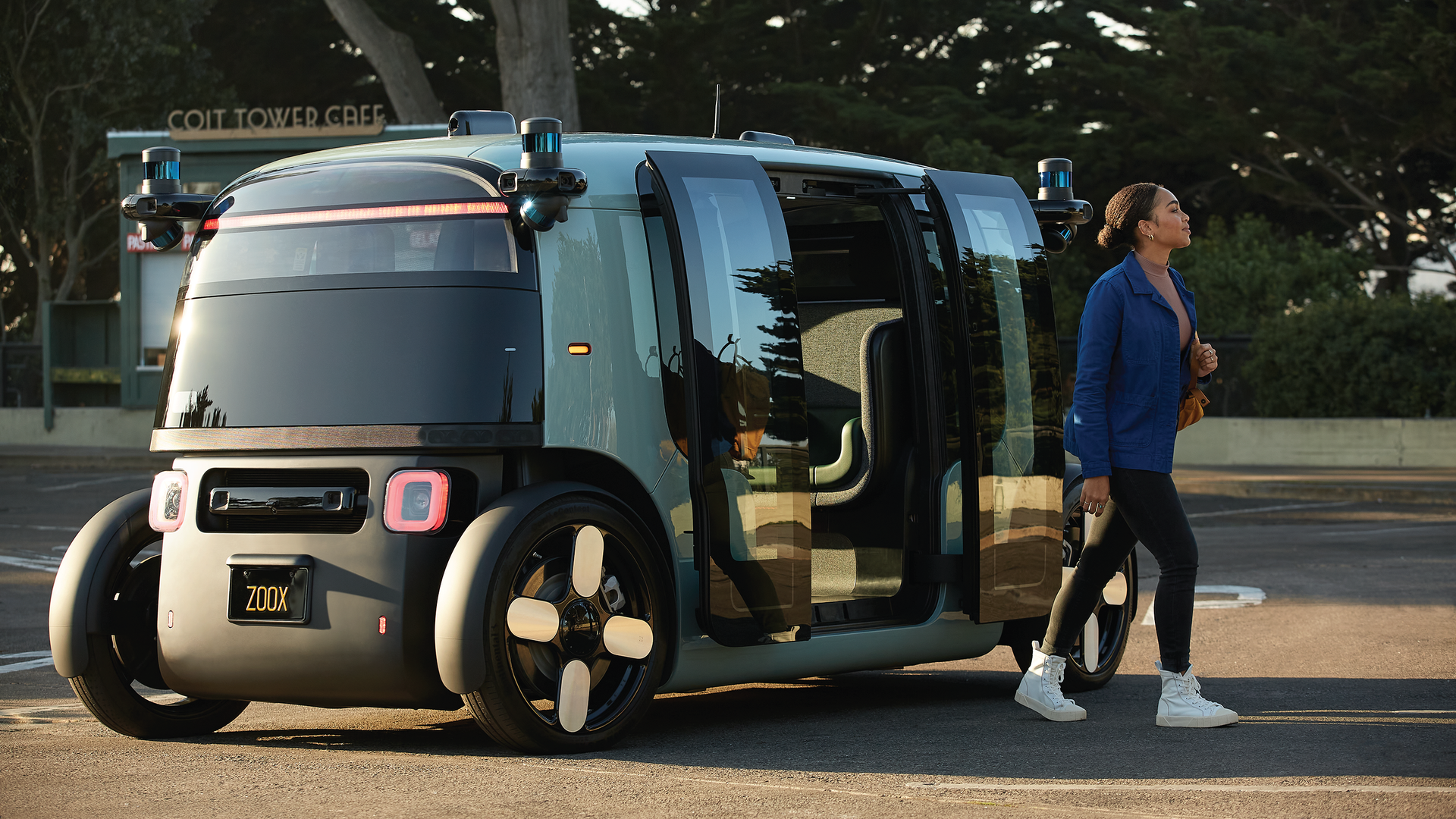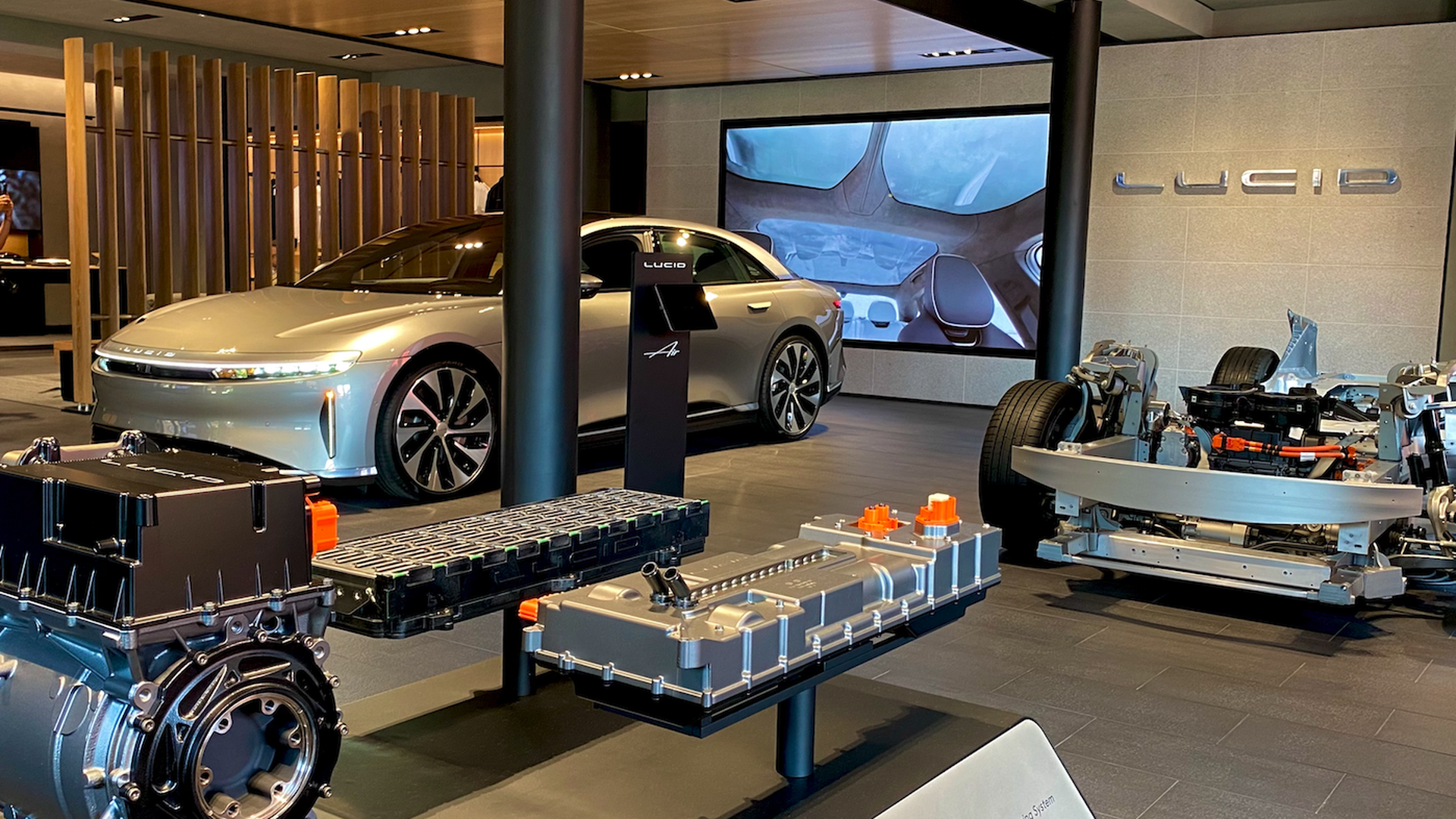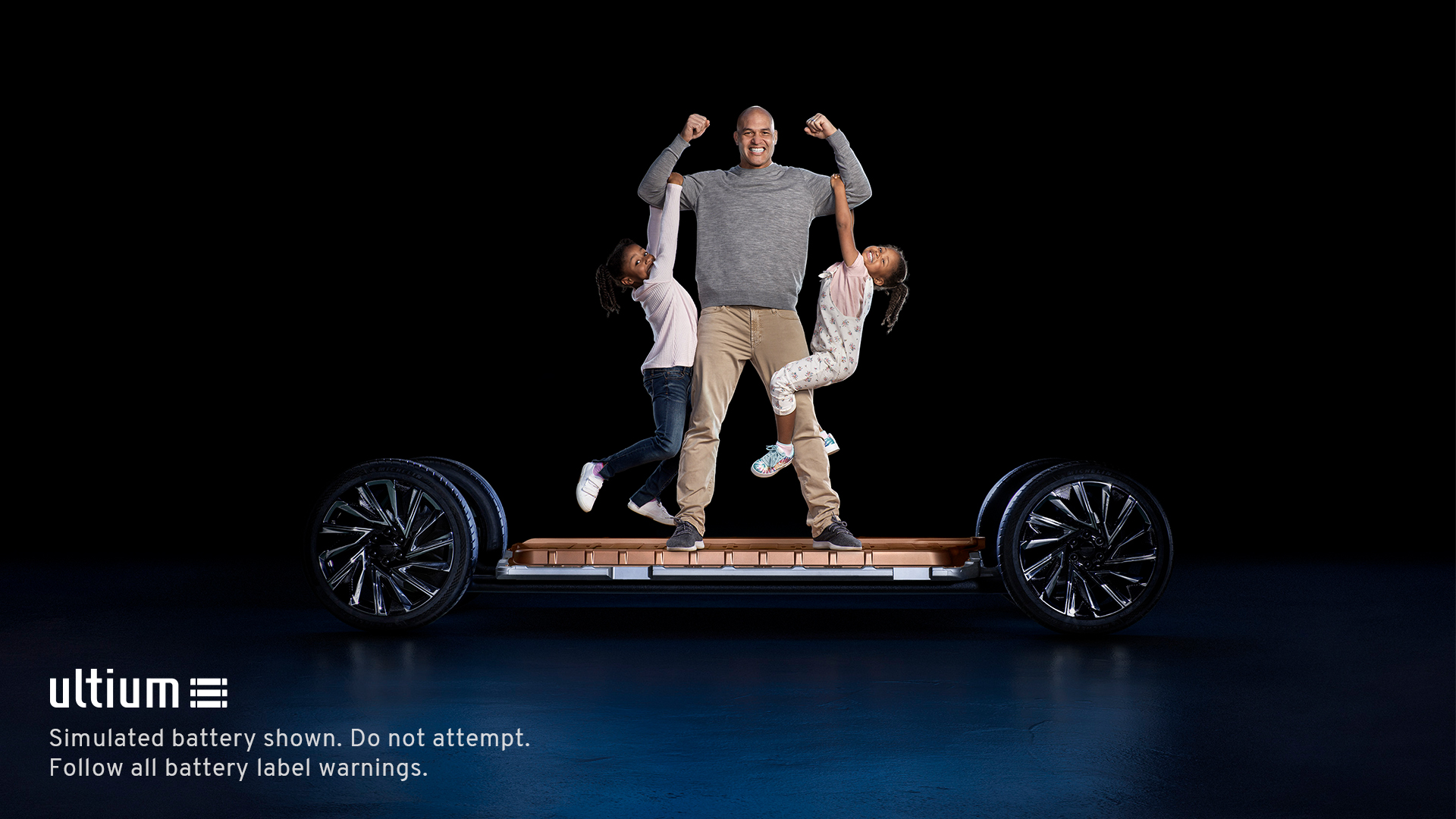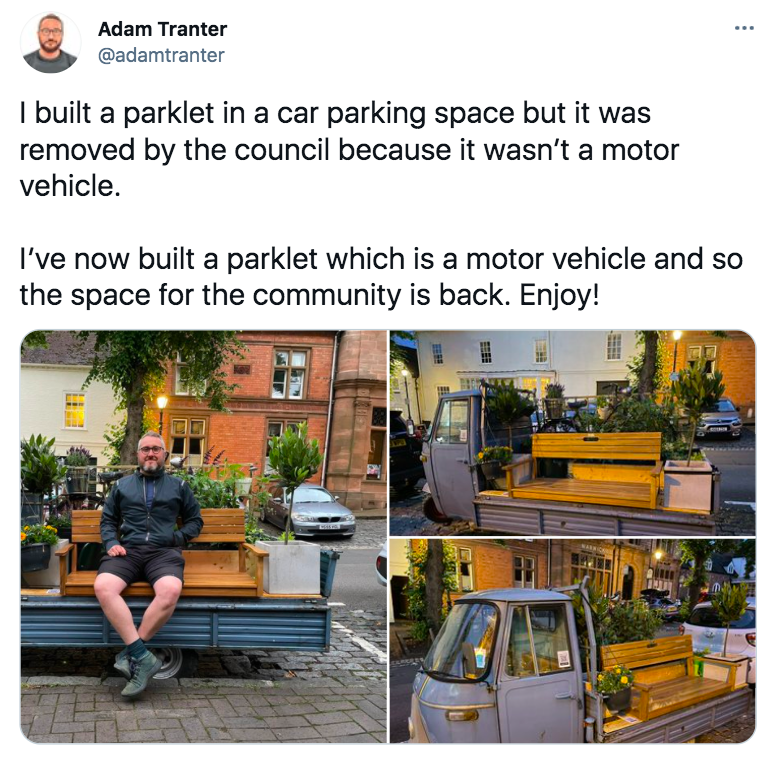| | | | | | | Presented By General Motors | | | | Axios What's Next | | By Bryan Walsh, Erica Pandey and Joann Muller ·Jun 23, 2021 | | Today we dive into autonomous vehicle safety, online grocery shopping trends and more. "What was next" trivia: On this day in 1868, Christopher Latham Sholes was awarded a patent for what invention? (Bonus points if you punctuate the device's name the way he did.) - Congrats to reader Stefani Koorey for the first correct answer to yesterday's trivia question: On this day in 1944, FDR signed what law that shaped a generation's educational opportunities? Answer: "The Servicemen's Readjustment Act of 1944 — commonly known as the GI Bill of Rights."
- Send your answer, along with tips and feedback, to whatsnext@axios.com.
- Today's newsletter, edited by Alison Snyder, is 1,213 words, a 4.5-minute read.
| | | | | | 1 big thing: Robotaxis require a safety rethink |  | | | Zoox's robotaxi is bidirectional and includes more than 100 safety innovations. Photo: Zoox | | | | Vehicles are being reimagined as autonomous, electric, toaster-shaped robotaxis. Now their safety has to be reworked too, Joann Muller writes. The big picture: There's more to self-driving cars than just removing the steering wheel and pedals. The entire vehicle needs to be redesigned for riders, not drivers, so their safety can be assured even when they're not in control. - The federal government has issued guidance but no firm safety regulations to companies developing autonomous vehicles, and Congress has been trying to advance an AV bill since 2017, with no success.
- For now, a patchwork of state regulations governs the testing and deployment of AVs and it's up to the AV industry to prove the safety of its vehicles.
Driving the news: Zoox, the San Francisco-based robotaxi startup, is highlighting the safety innovations in its AV as part of a voluntary safety self-assessment submitted this week to the National Highway Traffic Safety Administration. Details: The company says its purpose-built robotaxi, unveiled in December, has more than 100 safety innovations that don't exist in today's conventional cars. The big ones: - The four wheels are independent, so the speed, power and direction of each wheel are individually controlled. That translates into more precise steering and shorter stopping distances, giving the vehicle more time to react.
- There's no single point of failure. If something goes wrong, backup systems automatically kick in so the vehicle continues operating or is brought to a safe stop.
- Riders are equally protected, whether facing forward or backward, by an array of airbags that deploy from the ceiling or sides of the vehicle depending on the direction and severity of a crash.
- The Zoox vehicle won't move if sensors and cameras detect passengers aren't properly wearing seatbelts.
Yes, but: The robotaxi era is still a ways off, and Zoox can't say when its vehicle will be deployed. - Waymo was first to operate a robotaxi service, in Arizona, but it's limited. And Cruise recently got permission to carry passengers in California but not as a commercial service.
- "What people really want to know is, 'When do I leave my building, take out my app, and call a Zoox to go to the store?'" said former NHTSA administrator Mark Rosekind, now chief safety innovation officer at Zoox.
- "That kind of everywhere is 20 to 30 years away."
Read the rest. |     | | | | | | 2. Online grocery's staying power |  | | | Illustration: Sarah Grillo/Axios Visuals | | | | Online grocery was a minuscule part of food retail before the pandemic. Now, about 60% of U.S. consumers have bought groceries online in the last 12 months, and most of them plan to keep doing so post-pandemic, according to a report from Coresight Research. Why it matters: The rise of online food shopping is leaving behind smaller chains or mom-and-pop grocers that can't afford to offer delivery — turning grocery into a survival of the biggest players, Axios' Erica Pandey writes. - It's also fueling the creation of more gig jobs, as companies like Amazon, Walmart and Instacart search for workers to feed the delivery demand.
What's happening: The online grocery market swelled to $55.5 billion in 2020, an 81% increase from 2019, per Coresight, and that growth is expected to continue — albeit to a lesser extent — in 2021. One of the big drivers of growth in the grocery delivery market is older customers, experts say. - "We've had reluctant tech adopters forced to adopt tech in ways that they wouldn't have done in years or ever," says Betsey Stevenson, a University of Michigan economist.
- According to Coresight's survey, 62% of current online shoppers from the ages of 45 to 60 and 55% of those over the age of 60 plan to continue to use those services as frequently or more frequently after the pandemic.
|     | | | | | | 3. Showroom of the future |  | | | Lucid's new showroom in New York City. Photo: Hope King/Axios | | | | An electric vehicle startup's New York City showroom is a flashy workaround to its dealership problem — and a glimpse into what auto dealerships of the future may look like, Axios' Hope King writes. Why it matters: Showrooms like Lucid's also provide a blueprint for how early EV companies can use retail space to market vehicles and generate demand. - Strict rules currently prohibit most carmakers from selling directly to consumers onsite in more than two dozen states, including New York.
Driving the news: Axios previewed the retail space in Manhattan's trendy meatpacking district ahead of its public opening Saturday — and took a demo ride in the $139,000 Lucid Air Grand Touring model. - At 3,200 square feet, the space has enough room for one vehicle, a car parts exhibit — including the "skateboard," a virtual reality experience to preview interior and exterior car colors — and a retail area where visitors can browse fabric swatches and branded merchandise.
- None of the showroom staff have "sales" in their title — they are "studio advisers" and "associates" who assist with online ordering or customization questions. No one works on commission, even when a customer might initiate and complete an order in the store.
The big picture: Electric vehicles are still a tiny fraction of total car sales, but they're expected to make up at least 30% of the market share of new vehicle sales by 2030. - U.S. consumers don't seem to have a preference of how to buy EVs — with 37% saying in a March Morning Consult poll they would buy from a traditional dealership compared to 43% saying they would buy from either a manufacturer showroom or online.
- At the same time, more than 60% of auto executives polled through a 2020 KPMG study said the number of physical retail outlets will decline between 20% to 30% worldwide over the next five years.
Go deeper. |     | | | | | | A message from General Motors | | An EV for everyone | | |  | | | | General Motors is adding 30 new electric vehicles and producing the revolutionary Ultium Platform. The background: This is made possible by a $35 billion investment in EVs and AVs through 2025 to make the all-electric future accessible for everyone. | | | | | | 4. Where "living anywhere" will cost you |  Data: Mercer; Table: Axios Visuals Ashgabat, Turkmenistan, Hong Kong and Beirut are the world's most expensive cities for international employees, according to a new survey by the human resources consulting firm Mercer. New York topped the list of U.S. cities and is 14th globally. The big picture: The pandemic has popularized flexible and remote work, allowing workers to move out of the priciest cities and forcing companies to reassess the cost of living for employees living around the world. Details: U.S. metropolises like New York (No. 14), Los Angeles (No. 20) and San Francisco (No. 25) fell in the ranking this year, in large part due to the Euro gaining against the U.S. dollar, per the report. - The Turkmenistan capital tops the list due to an ongoing financial crisis in the country, while Beirut rose as a result of economic depression deepened by the pandemic and the Port of Beirut explosion last year.
How they did it: 209 cities on five continents are ranked on the cost of housing, transportation, food and about 200 other items in comparison to prices in New York City. |     | | | | | | 5. 1 green thing: Park(ing) spot | | Is this the future of cities? Adam Tranter, a marketing executive in the U.K., turned a parking spot into a public park, Erica also writes. - Technically only cars are allowed in the parking spots. Tranter got around that by building his park — complete with a bench and plants and flowers — on the back of a vehicle.
Check it out: The big picture: Cities all over the world are reconsidering the fate of their ugly parking garages and massive parking lots. Garages are turning into apartments and lots are becoming public squares with food trucks. |     | | | | | | A message from General Motors | | An EV for everyone | | |  | | | | General Motors is adding 30 new electric vehicles and producing the revolutionary Ultium Platform. The background: This is made possible by a $35 billion investment in EVs and AVs through 2025 to make the all-electric future accessible for everyone. | | | | Thanks for reading! If this email was forwarded to you, subscribe here. |  | | The tool and templates you need for more engaging team updates. | | | | | | Axios thanks our partners for supporting our newsletters. If you're interested in advertising, learn more here.
Sponsorship has no influence on editorial content. Axios, 3100 Clarendon Blvd, Suite 1300, Arlington VA 22201 | | | You received this email because you signed up for newsletters from Axios.
Change your preferences or unsubscribe here. | | | Was this email forwarded to you?
Sign up now to get Axios in your inbox. | | | | Follow Axios on social media:    | | | | | |










No comments:
Post a Comment